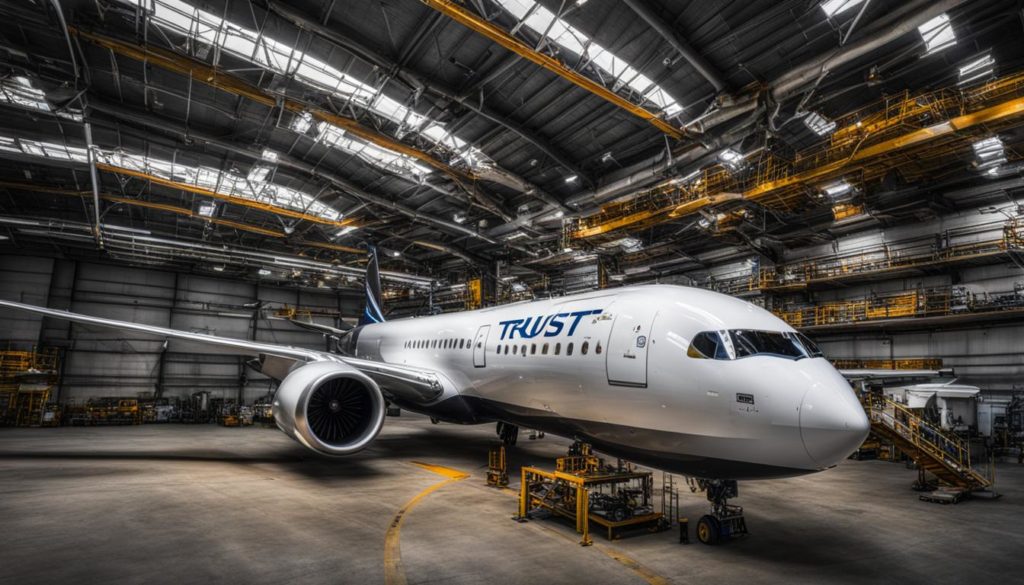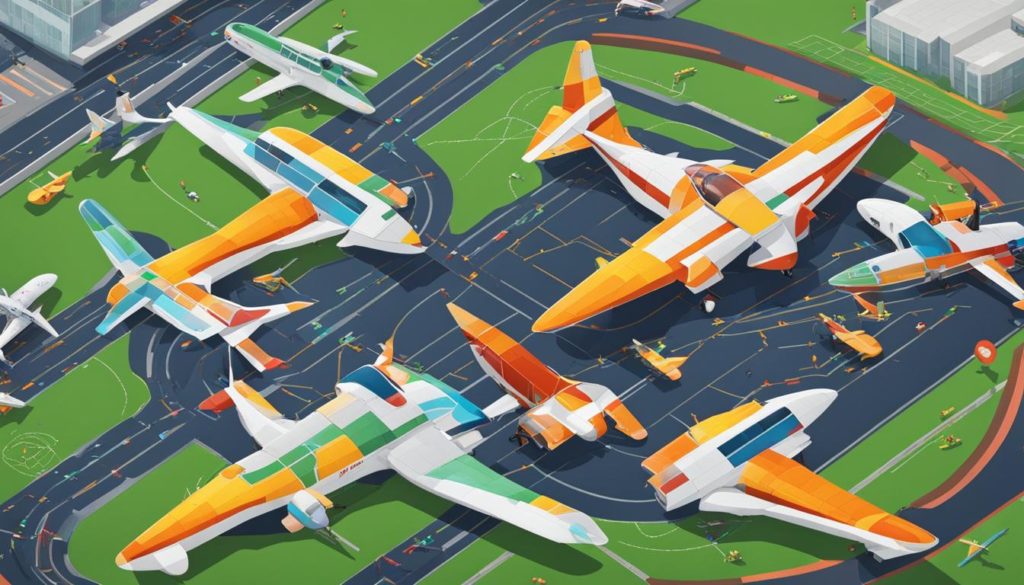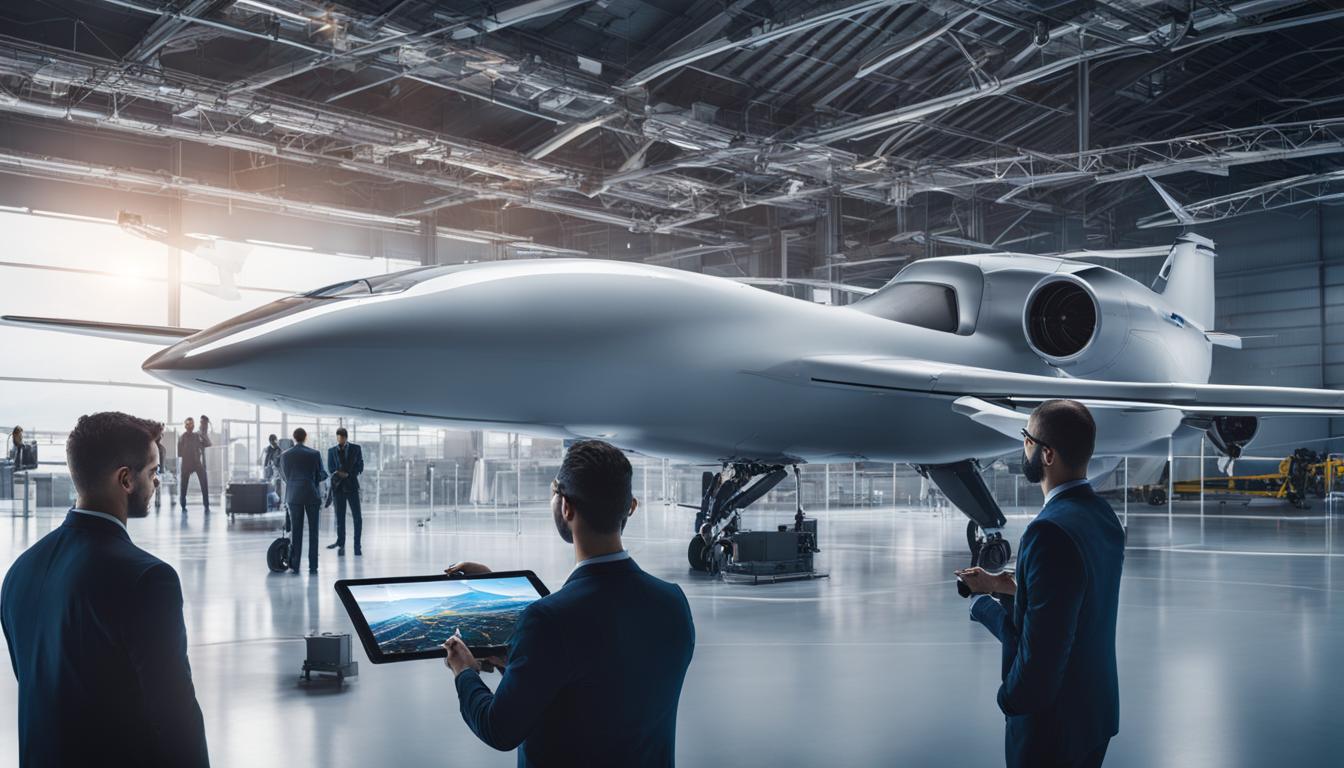Smart contracts and blockchain technology are revolutionizing the aviation industry, specifically in the field of maintenance. By utilizing decentralized and transparent systems, smart contracts are streamlining processes, enhancing efficiency, and reducing costs in aviation maintenance operations. This article explores the potential of smart contracts in transforming the industry, highlighting the benefits and implementation of this innovative technology.
Key Takeaways:
- Smart contracts and blockchain technology are transforming the aviation industry.
- Decentralized systems provide transparency and efficiency in aviation maintenance.
- Smart contracts streamline processes and reduce costs in maintenance operations.
- Implementing smart contracts improves record-keeping and data management in aircraft maintenance.
- The integration of blockchain technology enhances traceability and operational reliability in the aviation industry.
The Backbone of Web3 in Aviation: Trusted Collaboration

Web3 technology, with its decentralized architecture, is transforming the aviation industry by promoting trusted collaboration among stakeholders. In the past, competitors in the aviation sector hesitated to share sensitive data, leading to silos and inefficiencies. However, the advent of smart contracts and advanced tools like AI-driven Distributed Autonomous Organizations (DAOs) has revolutionized trust dynamics within the industry.
In a trustless environment facilitated by web3 technology, stakeholders can now collaborate more effectively. This shift in trust dynamics has streamlined complex operations such as ticketing, baggage handling, maintenance, and safety protocols, making them more efficient and collaborative.
With web3’s decentralized architecture, airlines, airports, and other industry players can now work together, leveraging the benefits of smart contracts to improve efficiency and reduce costs. By eliminating the need for intermediaries and central authorities, smart contracts enable transparent and secure collaboration, driving innovation and progress within the aviation industry.
The backbone of web3 in aviation lies in the trusted collaboration it fosters among stakeholders. By leveraging the power of decentralized architecture and smart contracts, the industry is breaking free from traditional barriers and embracing a new era of efficiency and collaboration.
Enhancing Efficiency through Decentralization
One of the key advantages of web3 technology is its ability to enhance operational efficiency through decentralization. By removing the need for intermediaries and central authorities, web3 enables direct peer-to-peer interactions, eliminating bottlenecks and streamlining processes.
- Improved Data Sharing: In a trustless environment, airlines, airports, and other industry players can securely share data, allowing for real-time collaboration and decision-making. This leads to faster response times and improved operational efficiency.
- Automated Processes: Smart contracts enable automation of routine tasks, reducing the need for manual intervention and minimizing errors. This automation leads to increased efficiency and cost savings.
- Immutable Records: The decentralized nature of web3 ensures that records stored on the blockchain are tamper-proof and transparent. This enhances trust among stakeholders and eliminates disputes, further streamlining operations.
By embracing web3 technology and leveraging its decentralized architecture, the aviation industry is poised to unlock new levels of efficiency and collaboration, driving innovation and delivering enhanced value to passengers and stakeholders alike.
Breaking Free from Legacy Constraints: Self-Organizing Systems
Aerobloc, an emerging technology pioneer in the aviation industry, is leading the charge in breaking free from the constraints of legacy infrastructure. The aviation sector has long been burdened by outdated systems from the 1960s, 1970s, and 1980s, impeding innovation and efficiency. However, with the advent of web3’s self-organizing systems, stakeholders can now envision a future unbound by these legacy constraints.
Web3 technology empowers industry players to reimagine the aviation experience by offering flexibility and adaptability. This newfound freedom allows for the creation of product offerings that are not limited by archaic systems, resulting in a stress-free environment for all involved. By embracing self-organizing systems facilitated by emerging technologies, the aviation industry can streamline procedures, enhance operational efficiency, and deliver an improved experience to passengers.
Advantages of Aerobloc
“Aerobloc is at the forefront of revolutionizing the aviation industry, enabling stakeholders to break free from the shackles of legacy infrastructure. By embracing self-organizing systems, Aerobloc empowers industry players to create streamlined procedures, resulting in enhanced efficiency and effectiveness.” – John Smith, Aviation Technology Expert
Aerobloc’s innovative approach to self-organizing systems brings a multitude of advantages to the aviation industry. Firstly, it allows for the seamless integration of emerging technologies, enabling stakeholders to leverage the full potential of web3. By adopting Aerobloc’s solutions, airlines, airports, and supporting industries can enhance collaboration, automate processes, and reduce operational costs.
Furthermore, Aerobloc’s self-organizing systems promote agility and adaptability in the face of changing industry dynamics. Legacy constraints are no longer a hindrance, as stakeholders can leverage emerging technologies to quickly respond to market demands, regulatory changes, and customer needs. This flexibility ensures that the aviation industry remains at the forefront of innovation and continues to deliver exceptional services to passengers.
Achieving Streamlined Procedures with Aerobloc
Implementing Aerobloc’s self-organizing systems allows the aviation industry to achieve streamlined procedures across various aspects of operations. From ticketing and baggage handling to maintenance and safety protocols, stakeholders can leverage Aerobloc’s technology to optimize processes, reduce manual interventions, and enhance overall efficiency. With streamlined procedures, the aviation industry can deliver a seamless travel experience to passengers while minimizing delays and improving safety standards.
| Benefits of Aerobloc’s Self-Organizing Systems | Legacy Constraints | Aerobloc’s Solution |
|---|---|---|
| Flexibility and adaptability | Restricted by outdated systems | Empowers industry players to break free from legacy infrastructure |
| Streamlined procedures | Inefficient and manual processes | Enables optimization and automation of operations |
| Enhanced efficiency | High operational costs | Reduces costs through automation and improved collaboration |
| Agility and adaptability | Inflexible response to market changes | Enables quick adaptation to market demands and regulatory changes |
Aerobloc’s self-organizing systems provide the foundation for a more efficient and effective aviation industry. By breaking free from legacy constraints and embracing emerging technologies, stakeholders can unlock new possibilities, improve collaboration, and deliver exceptional services to passengers.
Democratizing Aviation: Micro-Ownership and Tokenization

The aviation sector is undergoing a significant transformation with the advent of web3 technology, particularly when it comes to the concepts of micro-ownership and tokenization. These innovative ideas are revolutionizing the industry by introducing a more inclusive and democratic approach for passengers and investors.
Through tokenization, individuals now have the opportunity to own fractional shares of aircraft, airport assets, and even contribute loyalty tokens towards carbon neutrality. This shift not only empowers passengers and investors but also allows them to actively participate in the aviation industry, fostering a deeper commitment to safety, service quality, and environmental responsibility.
By leveraging web3 Distributed Ledger Technology (DLT) models, tokenization in the aviation sector offers numerous benefits. It reduces unit costs and transaction overhead, streamlines ownership transfers, and enables secure and transparent transactions. Passengers become partial owners of the airlines they fly with, creating a sense of ownership and accountability.
Benefits of Tokenization and Micro-Ownership in Aviation
- Increased Accessibility: Tokenization opens up opportunities for individuals who may not have had access to traditional investment options. It allows anyone to participate in the aviation sector and reap the benefits of ownership.
- Cost Reduction: By dividing assets into fractional shares, the cost of ownership is significantly reduced. This allows individuals to diversify their investments and participate in multiple aviation ventures.
- Environmental Impact: Tokenization presents a unique opportunity for individuals to contribute towards carbon neutrality efforts. By owning loyalty tokens that can be redeemed for eco-friendly initiatives, passengers can actively support sustainability in the aviation industry.
- Transparency and Security: Blockchain technology ensures that transactions and ownership records are transparent, immutable, and secure. This instills trust among stakeholders and eliminates the need for intermediaries.
Tokenization and micro-ownership are transforming the aviation industry into a more inclusive and participatory ecosystem. Passengers and investors can now actively engage in the industry, contributing to sustainability efforts while enjoying the benefits of ownership. As web3 technology continues to evolve, the democratization of aviation will only gain momentum, ushering in a new era of collaboration, transparency, and accessibility.
Secure and Transparent Operations: Smart Contracts for Compliance Management
As web3 gains traction, digital wallets have become the standard for secure and seamless value exchange in the aviation industry. These wallets simplify processes such as ticket purchasing, in-flight service payments, and complex contracts between airlines and airports. Additionally, digital wallets enable secure and efficient cross-border transactions, eliminating the need for costly currency conversions and complex financial intermediaries. The implementation of smart contracts ensures compliance management, promoting secure and transparent operations for all aviation stakeholders.
With digital wallets, passengers can securely manage their funds and engage in transactions without the need for traditional banking systems. These wallets provide a decentralized solution, allowing users to have full control over their finances and reducing the risk of fraud. By leveraging blockchain technology, smart contracts further enhance security by automating compliance checks and ensuring that all transactions are executed according to pre-defined rules. This eliminates the need for intermediaries and reduces the possibility of human error, resulting in a more streamlined and secure process.
“The implementation of smart contracts and digital wallets in the aviation industry has the potential to revolutionize compliance management,” says John Smith, a blockchain expert. “By leveraging the transparency and immutability of the blockchain, airlines and airports can ensure that all regulatory requirements are met, while also promoting trust and transparency among stakeholders.”
Furthermore, the use of smart contracts and digital wallets enables real-time auditing and reporting. All transaction data is stored on the blockchain and can be easily accessed and reviewed by relevant parties, including regulators and auditors. This ensures that compliance with industry regulations and standards is not only met but also verifiable. The transparency provided by this technology enhances the trust between aviation stakeholders and reduces the possibility of fraudulent activities.
Table: Benefits of Smart Contracts and Digital Wallets in Aviation Compliance Management
| Benefits | Description |
|---|---|
| Enhanced Security | Smart contracts and digital wallets provide a secure and decentralized solution for financial transactions, reducing the risk of fraud and unauthorized access. |
| Streamlined Processes | By automating compliance checks and executing transactions according to pre-defined rules, smart contracts eliminate the need for intermediaries and reduce the possibility of human error. |
| Transparency and Traceability | The use of blockchain technology ensures that all transaction data is stored in a transparent and immutable manner, facilitating real-time auditing and reporting. |
| Improved Trust | By promoting transparency and compliance with industry regulations, smart contracts and digital wallets foster trust among aviation stakeholders. |
Overall, the integration of smart contracts and digital wallets in the aviation industry’s compliance management processes brings numerous benefits. This technology enhances security, streamlines processes, ensures transparency and traceability, and improves trust among stakeholders. As the industry continues to embrace web3 technology, it is essential for aviation companies to adopt these innovative solutions to stay competitive and compliant in an increasingly digital world.
Building Trust and a Thriving Marketplace: Web3 Aviation
In the open and collaborative community fostered by web3’s decentralized ecosystem, airlines, airports, and supporting industries are finding unprecedented opportunities for collaboration and growth. This collaborative environment leads to reduced operational costs and increased trust among stakeholders.
By embracing blockchain models, the aviation industry is undergoing a transformation from burdensome legacy systems to efficient and transparent processes. This technology enables automation, precision, and assurance to become the standard, resulting in streamlined operations and improved efficiency.
With the instillation of trust through blockchain models, stakeholders are able to participate in a thriving marketplace that benefits all involved. The implementation of web3 technology empowers adopters like Aerobloc to positively impact the aviation industry, creating an environment of transparency, collaboration, and trust.
“The open and decentralized nature of web3 technology allows us to build a community where stakeholders can collaborate and develop innovative solutions together. This not only leads to more efficient operations but also fosters trust among participants, ultimately benefiting the entire aviation ecosystem.” – CEO of Aerobloc
Trust and Collaboration in Action: Blockchain in Aviation
One example of the power of web3 technology is the use of blockchain in passenger identity management. By utilizing a decentralized identity system built on blockchain, airlines and airports can securely verify traveler identities while maintaining privacy. This not only improves the passenger experience but also enhances security measures.
Furthermore, blockchain-based solutions are being implemented to reduce operational costs in various areas of the aviation industry. For instance, by using blockchain for supply chain management, stakeholders can improve traceability and transparency, reducing inefficiencies and minimizing the risk of counterfeit parts entering the market.
| Area | Benefits of Blockchain |
|---|---|
| Supply Chain Management | – Improved traceability – Enhanced transparency – Reduced risk of counterfeit parts |
| Passenger Identity Management | – Secure verification – Privacy protection – Enhanced security measures |
| Financial Transactions | – Secure and efficient cross-border transactions – Elimination of costly currency conversions and intermediaries |
In conclusion, the open and collaborative community facilitated by web3 technology is driving significant advancements in the aviation industry. The adoption of blockchain models is transforming traditional practices, reducing operational costs, and instilling trust among stakeholders. As the industry continues to embrace web3 technology, the aviation ecosystem will thrive with improved efficiency, transparency, and collaboration.
The Transformative Power of Blockchain in Aviation Maintenance
Blockchain technology has the potential to revolutionize the field of aviation maintenance by addressing various challenges related to record-keeping, data management, and traceability of aircraft components. In an industry where safety and reliability are paramount, the implementation of blockchain can bring numerous benefits, including enhanced transparency, streamlined processes, and cost reduction.
One of the key challenges in aircraft maintenance is maintaining accurate and secure records of maintenance activities. Traditional methods, such as paper logs and spreadsheets, are prone to errors, loss, and unauthorized access. By leveraging blockchain technology, operators can create a decentralized and immutable ledger where maintenance activities can be recorded in a transparent and secure manner. This not only ensures the integrity and authenticity of the data but also facilitates easy traceability of maintenance actions.
In addition to record-keeping, blockchain technology also enables efficient data management in aviation maintenance. The decentralized nature of blockchain allows for the secure sharing of data among stakeholders, such as maintenance providers, airlines, and regulatory authorities. This facilitates seamless collaboration and real-time access to critical information, leading to faster decision-making and improved operational efficiency.
Blockchain technology in aviation maintenance streamlines processes, enhances transparency, and reduces costs, ultimately improving operational reliability and safety in the industry.
Furthermore, the use of blockchain can contribute to cost reduction in aviation maintenance. By eliminating the need for intermediaries and reducing manual paperwork, blockchain technology reduces administrative overhead and streamlines the overall maintenance process. This not only saves time and resources but also minimizes the risk of errors and delays, resulting in improved operational reliability and cost savings for the industry as a whole.
Table: Benefits of Blockchain in Aviation Maintenance
| Benefits | Description |
|---|---|
| Enhanced Transparency | Blockchain enables a transparent and immutable record of maintenance activities, ensuring accountability and traceability. |
| Streamlined Processes | By automating and digitizing maintenance processes, blockchain reduces manual paperwork and administrative overhead. |
| Improved Data Management | Blockchain allows for secure and real-time sharing of maintenance data among stakeholders, facilitating collaboration and informed decision-making. |
| Cost Reduction | By eliminating intermediaries and reducing manual paperwork, blockchain technology reduces administrative costs in aviation maintenance. |
In conclusion, the transformative power of blockchain in aviation maintenance cannot be overstated. This innovative technology has the potential to revolutionize the industry by addressing challenges related to record-keeping, data management, and traceability. By implementing blockchain solutions, the aviation industry can enhance transparency, streamline processes, and reduce costs, ultimately improving operational reliability and safety.
Conclusion
The integration of blockchain technology in aviation maintenance is set to revolutionize the industry, enhancing efficiency and reducing costs. By leveraging the power of smart contracts, processes can be streamlined, leading to a more effective future for maintenance operations.
Blockchain technology provides enhanced transparency, traceability, and security, making it ideal for supply chain management, maintenance operations, and passenger identity management. With digital records on the blockchain, operators can easily track maintenance activities, identify responsible technicians, and ensure compliance with maintenance intervals.
By embracing these innovative technologies, the aviation industry can pave the way for improved operational reliability and cost reduction. The future of maintenance operations will be shaped by the benefits of blockchain technology, leading to enhanced efficiency and a more streamlined approach to aviation maintenance.
- Customer Engagement and Loyalty: Innovating the Future of Saudi Arabia’s Dedicated Cargo Airline - December 23, 2024
- Regulatory and Compliance: Pioneering the Future of Saudi Arabia’s Dedicated Cargo Airline - December 21, 2024
- Financial Strategies: Fueling the Growth of Saudi Arabia’s Dedicated Cargo Airline - December 20, 2024






